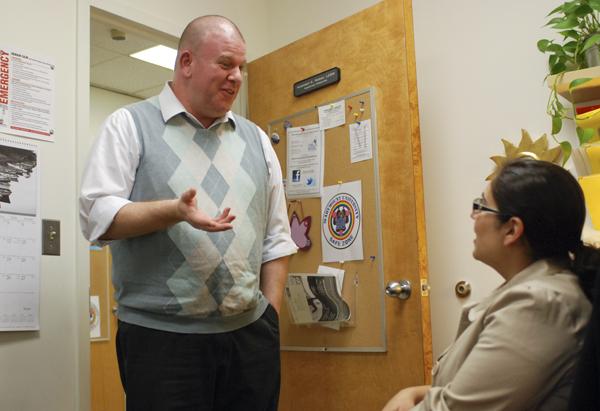As GW pushes forward with ambitious plans to revive the University Counseling Center, top administrators said the office has run out of room to grow.
Administrators have poured at least $150,000 into the UCC over the last year to hire staff members and has targeted expanding services like group help sessions – part of an effort to meet the soaring demand for appointments.
Though GW leaders want to keep growing the center, UCC director Silvio Weisner said he can’t bring on additional staff unless there is more space to meet with clients – a goal that Provost Steven Lerman called a “top priority” this year.
“Although there is a great deal that the UCC is doing with the space we currently have, our ability to increase staffing resources and broaden clinical services is limited by our space constraints,” Weisner said.
GW already found space for three more counselors this fall within its 2033 K St. building, giving UCC three offices that previously belonged to the engineering school.
Lerman said GW will likely reassign a few offices from the School of Public Health and Health Services, also in the K Street building, to UCC staff as the school’s new building opens in the spring.
Administrators have not mentioned other buildings as potential locations for UCC, though they have pointed out that dozens of departments in the public health and engineering schools will move into new buildings over the next few years.
Senior Vice Provost for Academic Affairs and Planning Forrest Maltzman, who is overseeing the academic department shuffle, agreed that finding space for UCC was a top concern.
“[The counseling center] is trying to add all these things and we’re running into the spot where their physical limitations are potentially a problem,” Maltzman said.
Weisner said he requested at least six more offices for clinicians to hold individual sessions, one additional large room to hold group sessions and a larger waiting room to accommodate the flood of walk-ins.
He said the office is able to accommodate its current demand, but “we don’t know what the UCC of the future will fully need, so we should do our best to be prepared and to have space into which we can grow.”
The demand for appointments has increased about 25 percent annually over the last three years, while walk-in requests skyrocketed nearly 200 percent over the last year.
UCC counted a total of 575 walk-in appointments from 2012-13, compared to 201 appointments the previous year.
Weisner said his staff of 18 barely fit into its largest room for meetings. The office includes about 18 private rooms, a waiting room that fits about 10 students and a larger group space for about 20 students.
GW’s staff is smaller than similar schools such as New York University and the University of Southern California, which boast 46 and 31 staff members, respectively. Northwestern University also has 31 staffers, while Duke University has 25.
UCC’s space crunch also threatens its plans to launch a graduate student training program within the next several years.
Weisner and other administrators, including Senior Associate Dean of Students Mark Levine, have touted the clinical training program as a way to boost staff morale after nearly the entire 11-member psychologist team left between 2009 through 2011, citing mismanagement by the then-director and associate director. Both ultimately resigned.
Shortly after former director John Dages left in December 2011, the University launched a review of the center that focused on staff retention and student outreach. Weisner took over a year later in the fall of 2012.
Weisner also wants to expand clinical specialists on issues such as addiction, in addition to increasing the availability of group therapy sessions.
The center could also collaborate with campus psychiatrists from Student Health Service to test for mental illnesses and disorders such as anxiety or ADHD – services that students reported had a wait time of up to five weeks at SHS last year.
“All of these initiatives require space – specifically, private offices with doors that close, which is a requirement for confidential clinical services,” Weisner said.
Weisner also said UCC needs more multipurpose space for a mental health resource library, events and workshops, which could involve student groups like Active Minds.
But Dean of Student Affairs Peter Konwerski said a permanent space is likely far-off. He added that no clear ideas that come to mind for a permanent location and that they will have to field many options before determining the right one.
“I think what will probably happen is it will be through a series of moves over time that will strike a bunch of us, like, ‘Hey, why don’t we think about this?’” he said.
Konwerski said the University will have to think about this situation in phases: an intermediate term of two to three years and a longer, three-to-five year term.
“Proximity is always ideal. You always want it to be located in the Marvin Center if you can get it in there,” he added. “But there’s not a quick fix. There’s nothing in the Marvin Center right now that is coming out that would allow it to move in.”








